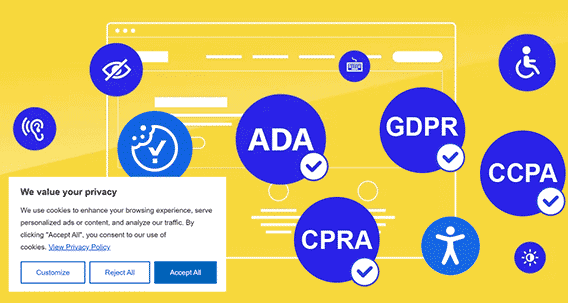Why Cookies Matter in the Digital Age
As the digital world evolves, so do privacy concerns. Ensuring that your website is compliant with current laws and regulations is no longer a luxury, it's a necessity. Partnering with CookieYes empowers us to help you give your website users control of their privacy. This platform offers a customizable cookie consent banner, records cookie consent, and manages all your cookie compliance needs in one place.
Understanding Internet Cookies
Internet cookies are crucial for enhancing website functionality and user experience. Also known as HTTP cookies, browser cookies, or web cookies, they are small pieces of data stored on a user's browser to remember settings, preferences, and other forms of identification.
Key Uses of Internet Cookies
- Showcasing tailored ads that resonate with users.
- Preserving individual website configurations.
- Logging user behaviors and interactions on a site.
- Shielding transaction details.
- Remembering items in a shopping cart.
Types of Internet Cookies
Before we discuss more on cookie consent, it is important to understand the different types of internet cookies and how they vary based on where they come from, how long they stay on your browser, and what they're used for.
Source-Based Cookies
- First-party cookies: Created by the visited website. They usually don't pose a privacy risk.
- Example: A user sees links to pages that were previously visited on the same website.
- Third-party cookies: Created by a website different from the one visited. Mainly used for tracking and advertising.
- Example: A user plays an embedded YouTube video on a website; YouTube then sets cookies on the user’s device to track their preferences and suggest similar videos.
Duration-Centric Cookies
- Session Cookies: Temporary cookies that expire when the browsing session ends. Session cookies allow websites to remember users within a website when they move between web pages.
- Example: A website remembers a user’s shopping cart items while they are navigating to various pages within the website without being logged in.
- Persistent Cookies: Long-lasting cookies that remember user preferences across sessions. These cookies typically come with an expiration period ranging from a single second to several years. Once the expiration date is reached, the cookies get deleted automatically from the user’s browser.
- Example: A website remembers a user’s information, settings, preferences, or sign-in credentials.
Purpose-Driven Cookies
- Strictly Necessary Cookies: Required for basic website functionality, without them, the site would not work. Also known as essential cookies, these internet cookies are exempt from cookie consent.
- Example: Enables users to log into secure areas and use a shopping cart.
- Performance Cookies: Collects anonymous data to improve website performance. Also referred to as statistics cookies, allow websites to provide an enhanced user experience by remembering the users.
- Example: Tracking the most popular pages or counting errors on damaged websites.
- Functional Cookies: Remembers user preferences for enhanced functionality. Also called preference cookies, they are not vital for the website to work, however, without them certain functions of the website may not be available.
- Example: Remembering items placed in an online shopping cart.
- Advertising Cookies: Used for tracking a user’s activities and behaviors to provide them with personalized advertisements.
Common Misunderstandings about Cookie Compliance
With the rise of data protection regulations worldwide, there’s been an escalating importance attached to cookie compliance. There are many misconceptions about internet cookies that have led to inadequate practices that can potentially harm both businesses and users, including:
- It's Just About Cookies: One major misconception is that compliance is merely about managing cookies. In reality, it's a broader spectrum encompassing user data protection, transparent data practices, and ensuring user rights like the right to access and delete personal information.
- One-Size-Fits-All: Not all regulations are created equal. EU Cookie Law, GDPR, and CCPA all have distinct requirements. Believing that adhering to one automatically means compliance with others is a risky misjudgment.
- If You’re Small, You’re Exempt: Many believe that smaller businesses or websites are exempt from compliance. In truth, most regulations apply irrespective of the company's size; it’s the data processing activities that matter.
- Explicit Consent is Always Required: While GDPR mandates explicit user consent, not all laws require it. The type of data being collected and the region's specific laws can dictate whether implied consent might be acceptable.
Cookie Policy vs. Privacy Policy: What's the Difference?
When navigating the complexities of data protection regulations and compliance, two terms often come up: cookie policy and privacy policy. While they both serve to inform visitors about your data-handling practices, they are not interchangeable and serve different purposes. However, a website cookie policy can be included in your website privacy policy page or as a standalone page. Let's break down what each policy is for and why you may need both.
What is a Cookie Policy?
A cookie policy is a legal document that provides detailed information about how your website uses cookies. It typically includes:
- Types of cookies used (e.g., session, persistent, third-party)
- Purpose of each cookie (e.g., analytics, tracking, personalization)
- How long the cookie data is stored
- How users can manage or opt out of cookies
What is a Privacy Policy?
A privacy policy is a broader legal document that explains how a website collects, uses, discloses, and manages a user's personal data. It usually covers:
- Types of data collected (e.g., names, email addresses, browsing history)
- How the data is used and shared
- Security measures to protect user data
- User rights concerning their data (e.g., right to access, correct, or delete data)
Why You Need Both
- Regulatory Requirements: Many jurisdictions require both policies. For example, GDPR necessitates a transparent privacy policy, while the ePrivacy Directive demands a specific cookie policy.
- User Trust: Clearly laying out your data-handling practices builds trust among your visitors. Users are more likely to engage with a site when they know their data is handled responsibly.
- Legal Protection: Having both a website cookie policy and website privacy policy reduces your risk of legal complications related to data collection and usage.
Cookie Consent Requirements
Cookie consent refers to the legal requirement to obtain user approval before deploying certain types of internet cookies. CookieYes is a solution that helps websites to be compliant with privacy laws by implementing cookie banners and automatically blocking non-essential cookies until consent is obtained.
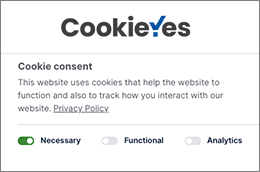
Types of Cookie Consent
- Implied Consent
- Banner Notification: Websites display a banner notifying users about the use of cookies. If users continue to use the site, consent is implied.
- Pop-Up Notification: A pop-up appears, informing users about cookies, and consent is implied when users continue to navigate the site.

- Explicit Consent
- Opt-In: Users are given a choice to accept or decline cookies before they can continue. Consent is not assumed or implied; users must actively give it by clicking "Accept" or a similar affirmative action.
- Granular Consent: Users have the option to choose specific types of internet cookies they want to allow, like performance cookies, targeting cookies, etc.
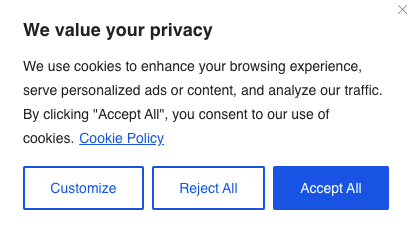
- Opt-Out Consent
- Users are informed that the site uses cookies, and they have the option to disable them, usually through settings or preferences in their web browsers.
How Does GDPR Affect Cookies?
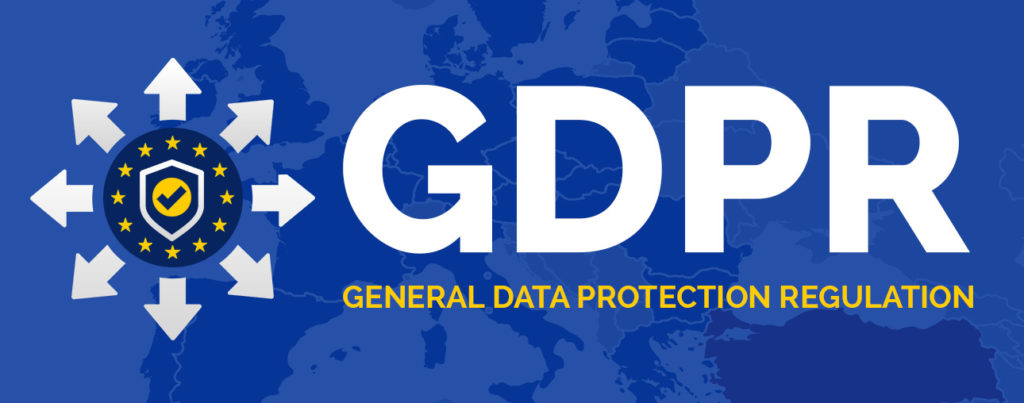
General Data Protection Regulation (GDPR) considers any information that can identify an individual as personal data. This includes data collected through cookies like IP addresses, usernames, and even behavioral data tracked for personalizing experiences or advertising. As a result, the GDPR places significant emphasis on obtaining informed, explicit consent from users before using cookies. This means pre-ticked boxes or assuming consent through inactivity isn't acceptable.
Why a Simple GDPR Banner Doesn’t Suffice
In the initial days of GDPR, a simple banner informing users about cookie use was a widespread practice. However, the landscape of data protection has matured, with clearer interpretations of the regulations and higher user awareness.
- Informed Consent: A plain banner doesn’t provide users with enough information to make an informed choice. GDPR mandates that users understand what they're consenting to, requiring detailed yet comprehensible information on cookie use.
- Granularity of Choices: GDPR emphasizes the user's right to choose. A simple banner doesn’t allow for granularity, i.e., letting users select which types of cookies they're comfortable with, such as distinguishing between performance cookies and advertising cookies.
- Revoking Consent: GDPR insists on the ease of withdrawing consent as it is to give it. Most basic banners don’t offer an intuitive way for users to change their preferences later.
- Ongoing Compliance: A static banner doesn’t adapt to changes in the website's cookie use or evolving legal requirements. Regular audits, updates to the cookie policy, and re-obtaining consent if there are significant changes, are all essential aspects of genuine compliance.
- Risk of Fines: Trusting a rudimentary banner can be costly. Non-compliance can result in hefty penalties, running into millions of euros, not to mention reputational damage.
How Does the CCPA Affect Cookies?
The California Consumer Privacy Act (CCPA) is not as strict as the GDPR. It does not require explicit consent from visitors to store cookies on their devices. It only requires websites to offer clear notice and choices to California consumers. This includes providing information about what type of internet cookies are used by the website, why, and how users can manage them.
Key Points to Include in GDPR & CCPA Cookie Compliance
- Transparency: Your website cookie policy must clearly state what types of internet cookies are in use and for what purpose. Users should also know how long the cookies will be stored and who has access to the information.
- Right to Withdraw: Users must have an easy option to withdraw their cookie consent at any time. This means not just an easy way to opt in, but also an easy way to opt out.
- Regular Audits: Websites are required to regularly review and refresh their cookie policy and practices to ensure they are up to date with current GDPR & CCPA requirements.
Take Control of Your Cookie Compliance
Understanding and managing cookies is critical in today's digital age. Cookie compliance may seem daunting, but the right tools can simplify the process.
Ready to make your website cookie compliant? Contact us today to get started!

